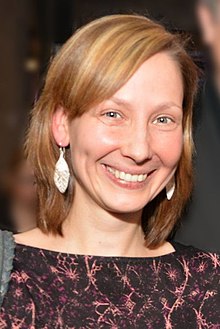
Christian Democratic and Flemish is a Flemish Christian-democratic political party in Belgium. The party has historical ties to both trade unionism (ACV) and trade associations (UNIZO) and the Farmer's League. Until 2001, the party was named the Christian People's Party.

The New Flemish Alliance is a Flemish nationalist, conservative and Eurosceptic political party in Belgium. The party was established in 2001 by the right-leaning faction of the centrist-nationalist People's Union (VU).
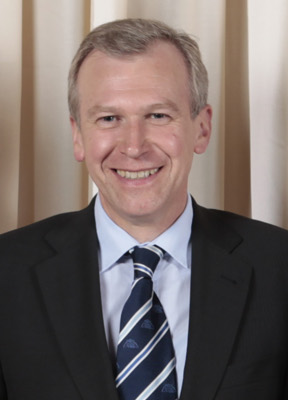
Yves Camille Désiré Leterme is a Belgian politician, a leader of the Christian Democratic and Flemish party (CD&V). He was the prime minister of Belgium from March 2008 to December 2008, and later from November 2009 to December 2011.

The Flemish Government is the executive branch of the Flemish Community and the Flemish Region of Belgium. It consists of a government cabinet, headed by the Minister-President and accountable to the Flemish Parliament, and the public administration divided into 13 policy areas, each with an executive department and multiple agencies.

Laurette A. J. Onkelinx is a Belgian politician from the Francophone Socialist Party. She was the Deputy Prime Minister – Minister of Social Affairs and Public Health in the Belgian federal government, i.e., the Di Rupo Government, which took office on 6 December 2011.
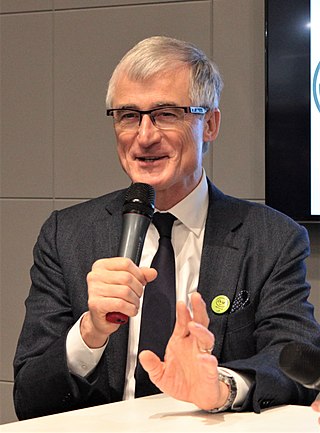
Geert Albert Bourgeois is a Belgian politician of the New Flemish Alliance (N-VA), which he founded in 2001, who is currently serving as a Member of the European Parliament since 2019. He previously served as the Minister-President of Flanders from 2014 to 2019. Prior to this, he was a member of the federal Chamber of Representatives for the People's Union from 1995 to 2001, and then for the N-VA from 2001 to 2004. He has been involved in local and regional politics in Flanders since 1976.

Federal elections were held in Belgium on 10 June 2007. Voters went to the polls in order to elect new members for the Chamber of Representatives and Senate.

Johan Maria Gerardus Vandeurzen is a Belgian politician, member of Christen-Democratisch en Vlaams (CD&V), a centrist Flemish Christian Democratic party.

Kris Peeters is a Belgian politician of the Christian Democratic and Flemish who served as vice-president of the European Investment Bank (EIB) from 2021 to 2024. Earlier in his career, he was Minister-President of Flanders (2007–2014), deputy prime minister and minister of economy and employment in the government of Prime Minister Charles Michel (2014–2019), and a Member of the European Parliament (2019–2021).
The 2007–2008 Belgian government formation followed the general election of 10 June 2007, and comprised a period of negotiation in which the Flemish parties Flemish Liberal Democratic, Christian Democratic and Flemish (CD&V) and New Flemish Alliance (N-VA), and the French-speaking parties Reformist Movement (MR), Democratic Front of Francophones (FDF) and Humanist Democratic Centre (CdH) negotiated to form a government coalition. The negotiations were characterized by the disagreement between the Dutch- and French-speaking parties about the need for and nature of a constitutional reform. According to some, this political conflict could have led to a partition of Belgium.
The Verhofstadt III government was an interim Belgian government inaugurated on 21 December 2007 and lasting until 23 March 2008. It was led by Belgian Prime Minister Guy Verhofstadt government and contained representatives from the Open Flemish Liberals and Democrats, Flemish Christian Democrats (CD&V), the Francophone Socialists (PS), the Francophone Liberals (MR) and Francophone Christian Democrats (CDH).
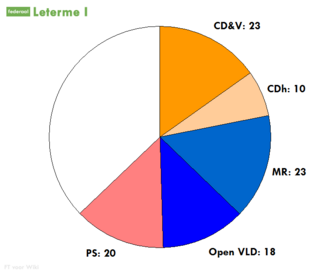
The Leterme I Government was the federal government of Belgium from 20 March 2008 to 22 December 2008. It took office when the Flemish Christian democrat Yves Leterme (CD&V) was sworn in as Prime Minister. It followed the Belgian general election of 2007 and comprised five parties: the Dutch-speaking Christian Democratic and Flemish (CD&V), the Dutch-speaking Open Flemish Liberals and Democrats, the French-speaking liberal Reformist Movement (MR), the French-speaking Socialist Party (PS) and the French-speaking Humanist Democratic Centre (CDH).
The 2007–2011 Belgian political crisis was a period of tense communal relations and political instability in Belgium, which was rooted in the differing opinions on state reform, and in the continued existence of the controversial electoral district of Brussels-Halle-Vilvoorde (BHV). Parties from the Dutch-speaking Flemish Community are in general strongly in favour for a devolution of powers to the communities and regions, and the splitting of the unconstitutional BHV district, while French-speaking French Community of Belgium is generally in favour of retaining the status quo. After the 2010 elections, the topics of public debt, deficit cuts and socio-economic reform were added to the debate, with most Flemish parties in favour of finding money by strongly reducing spending, whilst the proposals supported by most French-speaking parties also included a significant raise in taxes. The crisis came to an end in December 2011 with the inauguration of a new federal government which agreed on partition of the BHV district and on policies aimed at tackling the economic downturn. The country's continuing linguistic divide played a large part in the crisis. Several times during the period Belgium was threatened to be split up amid rising Flemish separatism.
The Van Rompuy Government was the federal government of Belgium from 30 December 2008 until 15 November 2009. Herman Van Rompuy was nominated as the first President of the European Council and resigned shortly after as Premier. It took office when the Flemish Christian Democrat Herman Van Rompuy was sworn in as Prime Minister after the Leterme I Government fell on 22 December 2008.
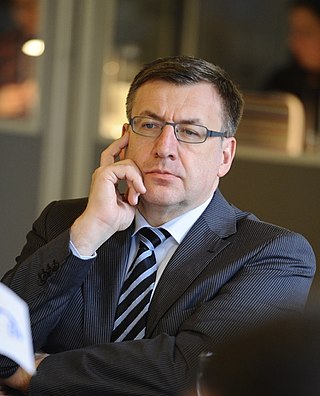
Steven Vanackere is a Belgian politician from Flanders and member of the Christian Democratic and Flemish party (CD&V). He held the portfolios of Deputy Prime Minister of Belgium and Minister of Foreign Affairs and Institutional Reform in the Leterme II government. He is the son of Leo Vanackere, who, following a political career as a Member of the Chamber of Representatives and the Senate of Belgium, became the Provincial Governor of West Flanders in 1979. His grandfather, Remi Wallays, had also been a senator and had been a former Mayor of Wevelgem.
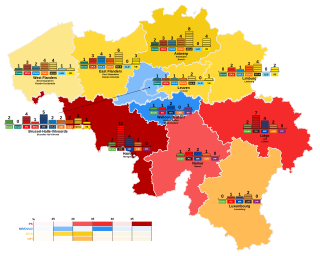
Federal elections were held in Belgium on 13 June 2010, during the midst of the 2007-11 Belgian political crisis. After the fall of the previous Leterme II Government over the withdrawal of Open Flemish Liberals and Democrats from the government the King dissolved the legislature and called new elections. The New Flemish Alliance, led by Bart De Wever, emerged as the plurality party with 27 seats, just one more than the francophone Socialist Party, led by Elio Di Rupo, which was the largest party in the Wallonia region and Brussels. It took a world record 541 days until a government was formed, resulting in a government led by Di Rupo.

The Leterme II Government was the federal government of Belgium from 25 November 2009 to 26 April 2010, and the caretaker government until 6 December 2011. It took office when the Flemish Christian Democrat Yves Leterme (CD&V) was sworn in as Prime Minister. It followed the Van Rompuy I Government which ended when Herman Van Rompuy became the first President of the European Council. It comprised five parties: the Dutch-speaking Christian Democratic and Flemish (CD&V), the Dutch-speaking Open Flemish Liberals and Democrats, the French-speaking liberal Reformist Movement (MR), the French-speaking Socialist Party (PS) and the French-speaking Humanist Democratic Centre (CDH).

Henri Maria Dymphna André Laurent "Rik" Torfs is a Belgian canon law scholar and media personality. He is a former Senator for the Christian Democratic and Flemish party in the Belgian Federal Parliament and a former Rector of the Catholic University of Leuven.
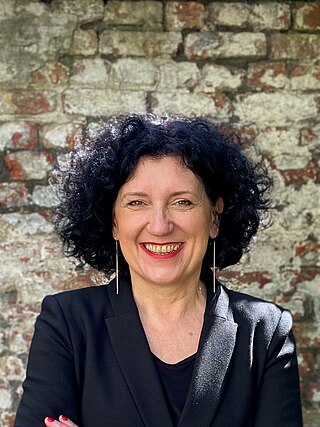
Annemie Turtelboom is a former Belgian minister, who served in the Federal Government of Belgium as a member of the Open VLD party, initially as minister for Asylum and Migration, and later Home Affairs and Justice. She has also served as minister of Finance, Budget and Energy in the Flemish Government. After leaving politics, she became the Belgian member of the European Court of Auditors, a position she has held since 2018.

The Di Rupo Government was the federal cabinet of Belgium sworn in on 6 December 2011, after a record-breaking 541 days of negotiations following the June 2010 elections. The government included social democrats (sp.a/PS), Christian democrats (CD&V/cdH) and liberals, respectively of the Dutch and French language groups. The government notably excluded the New Flemish Alliance (N-VA), the Flemish nationalist party which achieved a plurality and became the largest party. Its absence, together with the unwillingness of Open Vld to enter into an eight-party coalition that included the green parties, caused the government coalition to lack a majority in the Dutch language group. It was the first time that the Belgian prime minister had been openly gay, as Di Rupo became the world's first male openly gay head of government. Elio Di Rupo also became the first native French-speaking prime minister since 1979 and the first prime minister from Wallonia since 1974 and first socialist prime minister since 1974.
